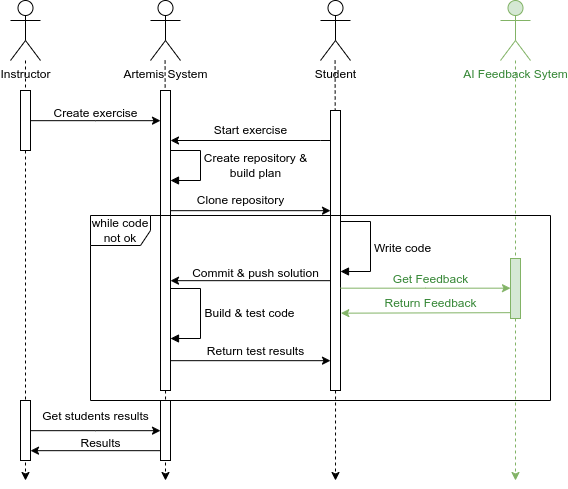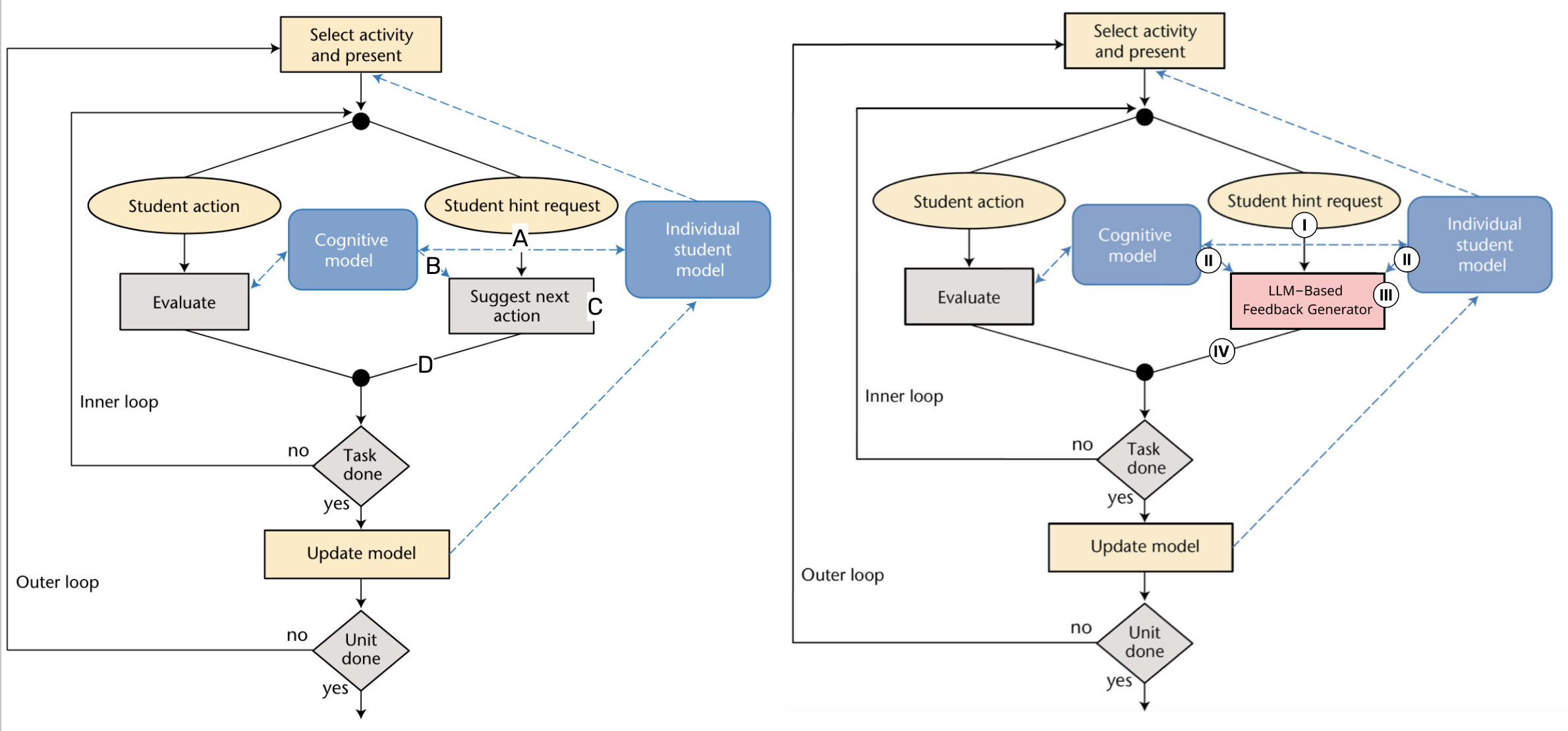AI-Tutoring in Software Engineering Education
2404.02548

0
0

Abstract
With the rapid advancement of artificial intelligence (AI) in various domains, the education sector is set for transformation. The potential of AI-driven tools in enhancing the learning experience, especially in programming, is immense. However, the scientific evaluation of Large Language Models (LLMs) used in Automated Programming Assessment Systems (APASs) as an AI-Tutor remains largely unexplored. Therefore, there is a need to understand how students interact with such AI-Tutors and to analyze their experiences. In this paper, we conducted an exploratory case study by integrating the GPT-3.5-Turbo model as an AI-Tutor within the APAS Artemis. Through a combination of empirical data collection and an exploratory survey, we identified different user types based on their interaction patterns with the AI-Tutor. Additionally, the findings highlight advantages, such as timely feedback and scalability. However, challenges like generic responses and students' concerns about a learning progress inhibition when using the AI-Tutor were also evident. This research adds to the discourse on AI's role in education.
Get summaries of the top AI research delivered straight to your inbox:
Overview
- This paper explores the use of AI-based tutoring systems in software engineering education.
- It investigates the potential of AI technologies, such as ChatGPT and OpenAI, to enhance the learning experience and assessment of software engineering students.
- The paper also discusses the challenges and considerations involved in implementing AI-powered tutoring systems in this context.
Plain English Explanation
The paper examines how artificial intelligence (AI) technologies can be used to improve the way software engineering is taught and learned. It looks at the potential of AI-based tutoring systems, which are computer programs designed to guide and support students as they learn about software development.
The researchers are particularly interested in exploring the use of advanced AI models, like ChatGPT and OpenAI, to enhance the learning experience for software engineering students. These AI models can engage in natural language conversations, provide personalized feedback, and even help with the assessment of students' work.
The paper discusses the various ways in which AI-powered tutoring systems could be beneficial for software engineering education. For example, they could offer more personalized and adaptive learning experiences, allowing students to progress at their own pace and receive targeted guidance. They could also potentially save instructors time by automating certain tasks, such as providing feedback on programming assignments.
However, the paper also acknowledges the challenges and considerations involved in implementing these AI technologies in the context of software engineering education. It highlights the need to ensure the accuracy and reliability of the AI systems, as well as the importance of maintaining human oversight and control.
Technical Explanation
The paper presents a comprehensive review of the use of AI-based tutoring systems in software engineering education. It explores the potential benefits and challenges of incorporating these technologies into the teaching and learning of software development.
The researchers examine the current state of the art in AI-powered personalized learning and distributed agency in language learning and teaching. They analyze how advanced AI models, such as ChatGPT and OpenAI, can be leveraged to enhance the assessment and feedback mechanisms in software engineering education.
The paper outlines a methodological approach for integrating AI-based tutoring systems into software engineering curricula. This includes considerations around the design of the AI systems, the integration with existing educational technologies, and the evaluation of their effectiveness.
The researchers also discuss the potential challenges and limitations of AI-based tutoring systems in this context. These include issues related to the accuracy and reliability of the AI models, the need for human oversight and control, and the potential impact on the student-teacher relationship.
Critical Analysis
The paper provides a well-researched and thoughtful analysis of the potential benefits and challenges of using AI-based tutoring systems in software engineering education. The researchers have clearly identified the key considerations and have presented a robust methodological approach for integrating these technologies into the classroom.
However, the paper could have delved deeper into some of the potential drawbacks and limitations of the proposed approach. For example, it could have explored the ethical implications of relying heavily on AI systems in the educational context, such as concerns around bias, privacy, and the impact on student autonomy.
Additionally, the paper could have acknowledged the need for extensive testing and validation of the AI systems before they are deployed in real-world educational settings. This would help to ensure the reliability and accuracy of the feedback and assessments provided by the AI tutors.
Overall, the paper presents a compelling case for the use of AI-based tutoring systems in software engineering education, but it could have been strengthened by a more thorough examination of the potential risks and challenges involved.
Conclusion
This paper makes a strong argument for the integration of AI-based tutoring systems into software engineering education. The researchers have demonstrated the potential of advanced AI models, such as ChatGPT and OpenAI, to enhance the learning experience and assessment of software engineering students.
The proposed methodological approach provides a practical framework for implementing these technologies in the classroom, while also addressing the key challenges and considerations involved. As the field of AI continues to evolve, the insights and strategies presented in this paper could be invaluable for educators looking to leverage these powerful tools to improve software engineering education.
This summary was produced with help from an AI and may contain inaccuracies - check out the links to read the original source documents!
Related Papers

Evaluating the Effectiveness of LLMs in Introductory Computer Science Education: A Semester-Long Field Study
Wenhan Lyu (Rachel), Yimeng Wang (Rachel), Tingting (Rachel), Chung, Yifan Sun, Yixuan Zhang

0
0
The integration of AI assistants, especially through the development of Large Language Models (LLMs), into computer science education has sparked significant debate. An emerging body of work has looked into using LLMs in education, but few have examined the impacts of LLMs on students in entry-level programming courses, particularly in real-world contexts and over extended periods. To address this research gap, we conducted a semester-long, between-subjects study with 50 students using CodeTutor, an LLM-powered assistant developed by our research team. Our study results show that students who used CodeTutor (the experimental group) achieved statistically significant improvements in their final scores compared to peers who did not use the tool (the control group). Within the experimental group, those without prior experience with LLM-powered tools demonstrated significantly greater performance gain than their counterparts. We also found that students expressed positive feedback regarding CodeTutor's capability, though they also had concerns about CodeTutor's limited role in developing critical thinking skills. Over the semester, students' agreement with CodeTutor's suggestions decreased, with a growing preference for support from traditional human teaching assistants. Our analysis further reveals that the quality of user prompts was significantly correlated with CodeTutor's response effectiveness. Building upon our results, we discuss the implications of our findings for integrating Generative AI literacy into curricula to foster critical thinking skills and turn to examining the temporal dynamics of user engagement with LLM-powered tools. We further discuss the discrepancy between the anticipated functions of tools and students' actual capabilities, which sheds light on the need for tailored strategies to improve educational outcomes.
5/6/2024
🌐
ChatGPT Is Here to Help, Not to Replace Anybody -- An Evaluation of Students' Opinions On Integrating ChatGPT In CS Courses
Bruno Pereira Cipriano, Pedro Alves

0
0
Large Language Models (LLMs) like GPT and Bard are capable of producing code based on textual descriptions, with remarkable efficacy. Such technology will have profound implications for computing education, raising concerns about cheating, excessive dependence, and a decline in computational thinking skills, among others. There has been extensive research on how teachers should handle this challenge but it is also important to understand how students feel about this paradigm shift. In this research, 52 first-year CS students were surveyed in order to assess their views on technologies with code-generation capabilities, both from academic and professional perspectives. Our findings indicate that while students generally favor the academic use of GPT, they don't over rely on it, only mildly asking for its help. Although most students benefit from GPT, some struggle to use it effectively, urging the need for specific GPT training. Opinions on GPT's impact on their professional lives vary, but there is a consensus on its importance in academic practice.
4/29/2024

Enhancing LLM-Based Feedback: Insights from Intelligent Tutoring Systems and the Learning Sciences
John Stamper, Ruiwei Xiao, Xinying Hou

0
0
The field of Artificial Intelligence in Education (AIED) focuses on the intersection of technology, education, and psychology, placing a strong emphasis on supporting learners' needs with compassion and understanding. The growing prominence of Large Language Models (LLMs) has led to the development of scalable solutions within educational settings, including generating different types of feedback in Intelligent Tutoring Systems. However, the approach to utilizing these models often involves directly formulating prompts to solicit specific information, lacking a solid theoretical foundation for prompt construction and empirical assessments of their impact on learning. This work advocates careful and caring AIED research by going through previous research on feedback generation in ITS, with emphasis on the theoretical frameworks they utilized and the efficacy of the corresponding design in empirical evaluations, and then suggesting opportunities to apply these evidence-based principles to the design, experiment, and evaluation phases of LLM-based feedback generation. The main contributions of this paper include: an avocation of applying more cautious, theoretically grounded methods in feedback generation in the era of generative AI; and practical suggestions on theory and evidence-based feedback design for LLM-powered ITS.
5/14/2024

Iris: An AI-Driven Virtual Tutor For Computer Science Education
Patrick Bassner, Eduard Frankford, Stephan Krusche

0
0
Integrating AI-driven tools in higher education is an emerging area with transformative potential. This paper introduces Iris, a chat-based virtual tutor integrated into the interactive learning platform Artemis that offers personalized, context-aware assistance in large-scale educational settings. Iris supports computer science students by guiding them through programming exercises and is designed to act as a tutor in a didactically meaningful way. Its calibrated assistance avoids revealing complete solutions, offering subtle hints or counter-questions to foster independent problem-solving skills. For each question, it issues multiple prompts in a Chain-of-Thought to GPT-3.5-Turbo. The prompts include a tutor role description and examples of meaningful answers through few-shot learning. Iris employs contextual awareness by accessing the problem statement, student code, and automated feedback to provide tailored advice. An empirical evaluation shows that students perceive Iris as effective because it understands their questions, provides relevant support, and contributes to the learning process. While students consider Iris a valuable tool for programming exercises and homework, they also feel confident solving programming tasks in computer-based exams without Iris. The findings underscore students' appreciation for Iris' immediate and personalized support, though students predominantly view it as a complement to, rather than a replacement for, human tutors. Nevertheless, Iris creates a space for students to ask questions without being judged by others.
5/15/2024